| Supported Target Versions |
|---|
| REST API: REST API V1 and V2 |
| Poly Trio 8800 |
Application Version and Upgrade Details
| Application Version | Bug fixes / Enhancements |
|---|---|
| 2.0.1 |
|
| 2.0.0 | Full discovery support added. |
| 1.0.1 | Alert custom macros support. |
Click here to view the earlier version updates
| Application Version | Bug fixes / Enhancements |
|---|---|
| 1.0.0 | Initial sdk2.0 app discovery & monitoring implementation. |
Introduction
Polycom Trio is a modern conference room smartphone. Integrating our legendary voice quality, with powerful video and content performance, Polycom Trio can easily transform conference rooms of all sizes into collaborative, hassle-free team environments. Polycom-Trio helps you:
- Discover and monitor your Polycom devices.
- Check device availability and reliability.
Prerequisites
- OpsRamp Classic Gateway 14.0.0 and above.
- OpsRamp NextGen Gateway 14.0.0 and above.
Note: OpsRamp recommends using the latest Gateway version for full coverage of recent bug fixes, enhancements, etc.
Default Monitoring Configurations
Poly-Trio application has default Global Device Management Policies, Global Templates, Global Monitors and Global metrics in OpsRamp. You can customize these default monitoring configurations as per your business use cases by cloning respective Global Templates and Global Device Management Policies. OpsRamp recommends doing this activity before installing the application to avoid noise alerts and data.
Default Global Device Management Policies
OpsRamp has a Global Device Management Policy for each Native Type of Poly-Trio. You can find those Device Management Policies at Setup > Resources > Device Management Policies, search with suggested names in global scope. Each Device Management Policy follows below naming convention:
{appName nativeType - version}Ex: poly-trio Poly Trio - 1 (i.e, appName = poly-trio, nativeType = Poly Trio, version = 1)
Default Global Templates
OpsRamp has a Global Template for each Native Type of POLY-TRIO. You can find those templates at Setup > Monitoring > Templates, search with suggested names in global scope. Each template follows below naming convention:
{appName nativeType 'Template' - version}Ex: poly-trio Poly Trio Template - 1 (i.e, appName = poly-trio, nativeType = Poly Trio, version = 1)
Default Global Monitors
OpsRamp has a Global Monitors for each Native Type which has monitoring support. You can find those monitors at Setup > Monitoring > Monitors, search with suggested names in global scope. Each Monitors follows below naming convention:
{monitorKey appName nativeType - version}Ex: Poly Trio Monitor poly-trio Poly Trio 1 (i.e, monitorKey = Poly Trio Monitor, appName = poly-trio nativeType = Poly Trio, version = 1)
Configure and Install the Poly Trio Integration
- From All Clients, select a client.
- Go to Setup > Account.
- Select the Integrations and Apps tab.
- The Installed Integrations page, where all the installed applications are displayed. If there are no installed applications, it will navigate to the Available Integrations and Apps page.
- Click + ADD on the Installed Integrations page. The Available Integrations and Apps page displays all the available applications along with the newly created application with the version.
- Search for the application using the search option available. Alternatively, use the All Categories option to search.
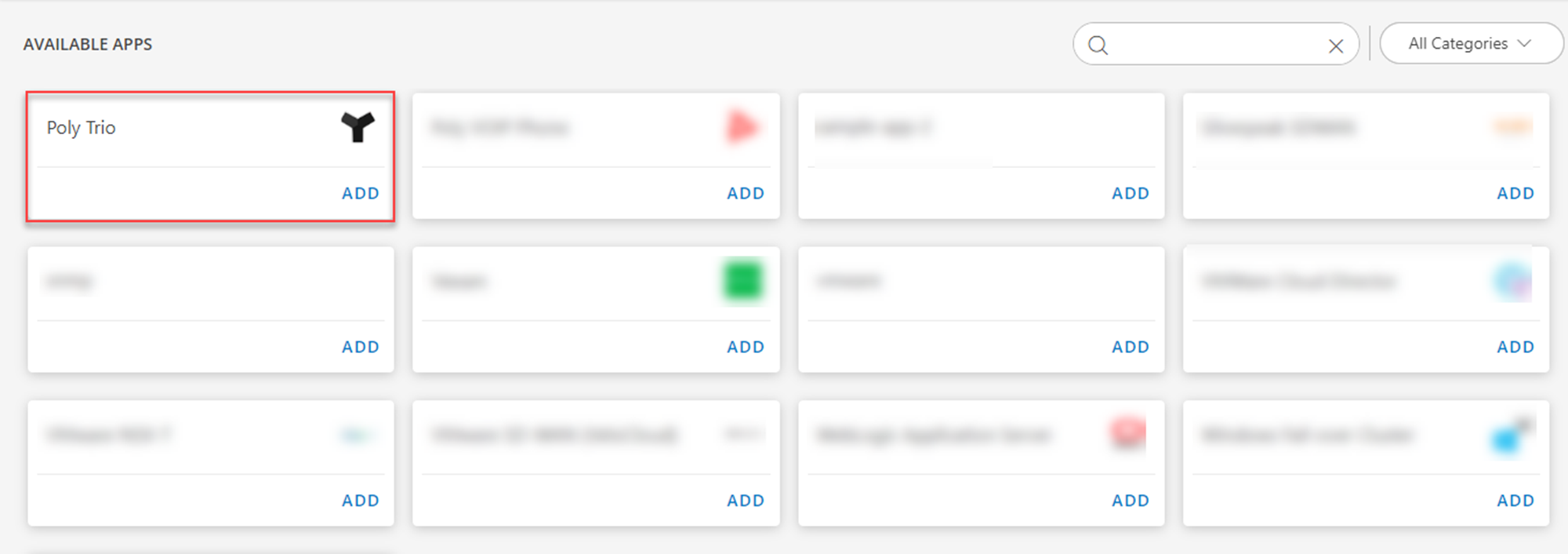
- Click ADD in the Poly Trio application.
- In the Configurations page, click + ADD. The Add Configuration page appears.
- Enter the below mentioned BASIC INFORMATION:
| Functionality | Description |
|---|---|
| Name | Enter the name for the configuration. |
| Host Name / IP Address | Provide the Host Name / IP Address. |
| Resource Instance Name | Enter the resource instance name |
| Port | Port Note: By default 443 is added. |
| Credentials | Select the credentials from the drop-down list. Note: Click + Add to create a credential. |
Notes:
- By default the isSecure checkbox is selected.
- Host Name / IP Address and Port should be accessible from Gateway.
- Select App Failure Notifications; if turned on, you will be notified in case of an application failure that is, Connectivity Exception, Authentication Exception.
- Select the below mentioned Custom Attribute:
| Functionality | Description |
|---|---|
| Custom Attribute | Select the custom attribute from the drop down list box. |
| Value | Select the value from the drop down list box. |
Note: The custom attribute that you add here will be assigned to all the resources that are created by the integration. You can add a maximum of five custom attributes (key and value pair).
- In the RESOURCE TYPE section, select:
- ALL: All the existing and future resources will be discovered.
- SELECT: You can select one or multiple resources to be discovered.
- In the DISCOVERY SCHEDULE section, select Recurrence Pattern to add one of the following patterns:
- Minutes
- Hourly
- Daily
- Weekly
- Monthly
- Click ADD.
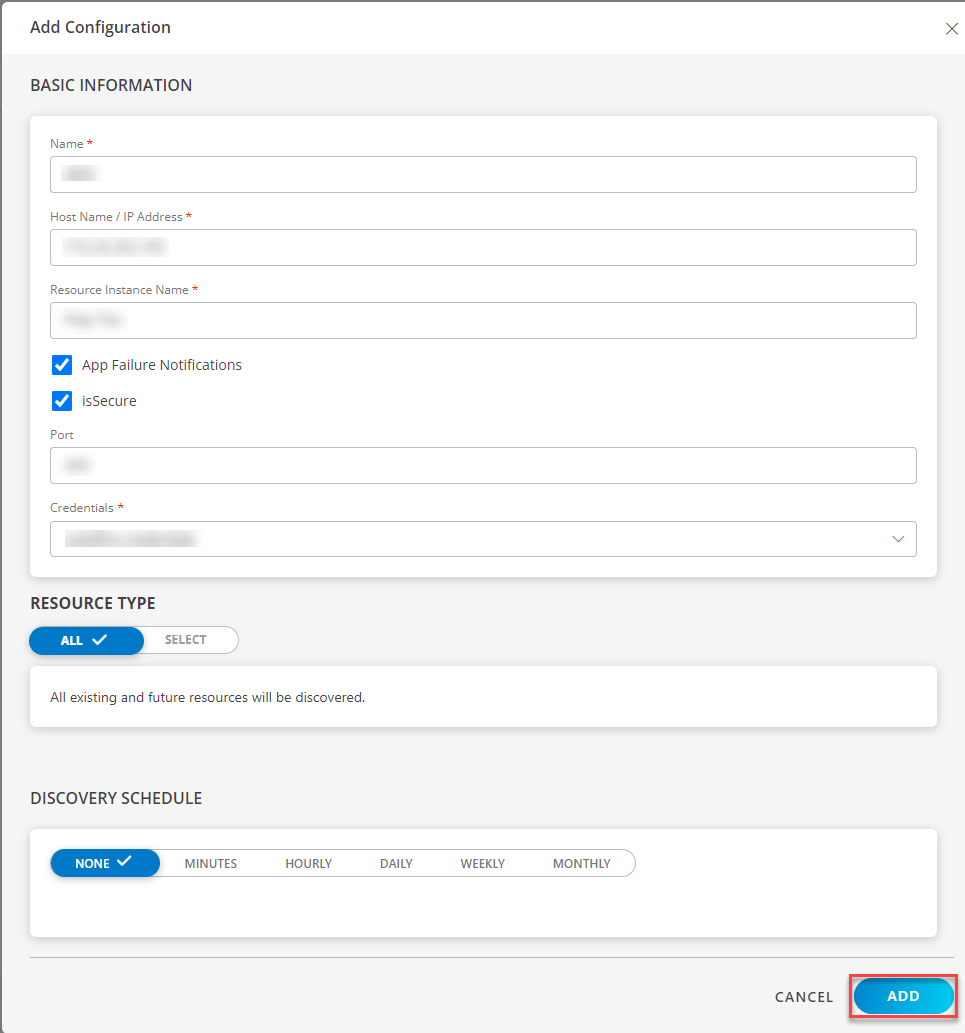
Now the configuration is saved and displayed on the configurations page after you save it.
Note: From the same page, you may Edit and Remove the created configuration.
- Click NEXT
- Below are the optional steps you can perform on the Installation page.
Under the ADVANCED SETTINGS, Select the Bypass Resource Reconciliation option, if you wish to bypass resource reconciliation when encountering the same resources discovered by multiple applications.
Note: If two different applications provide identical discovery attributes, two separate resources will be generated with those respective attributes from the individual discoveries.

- Click +ADD to create a new collector by providing a name or use the pre-populated name.

- Select an existing registered profile.
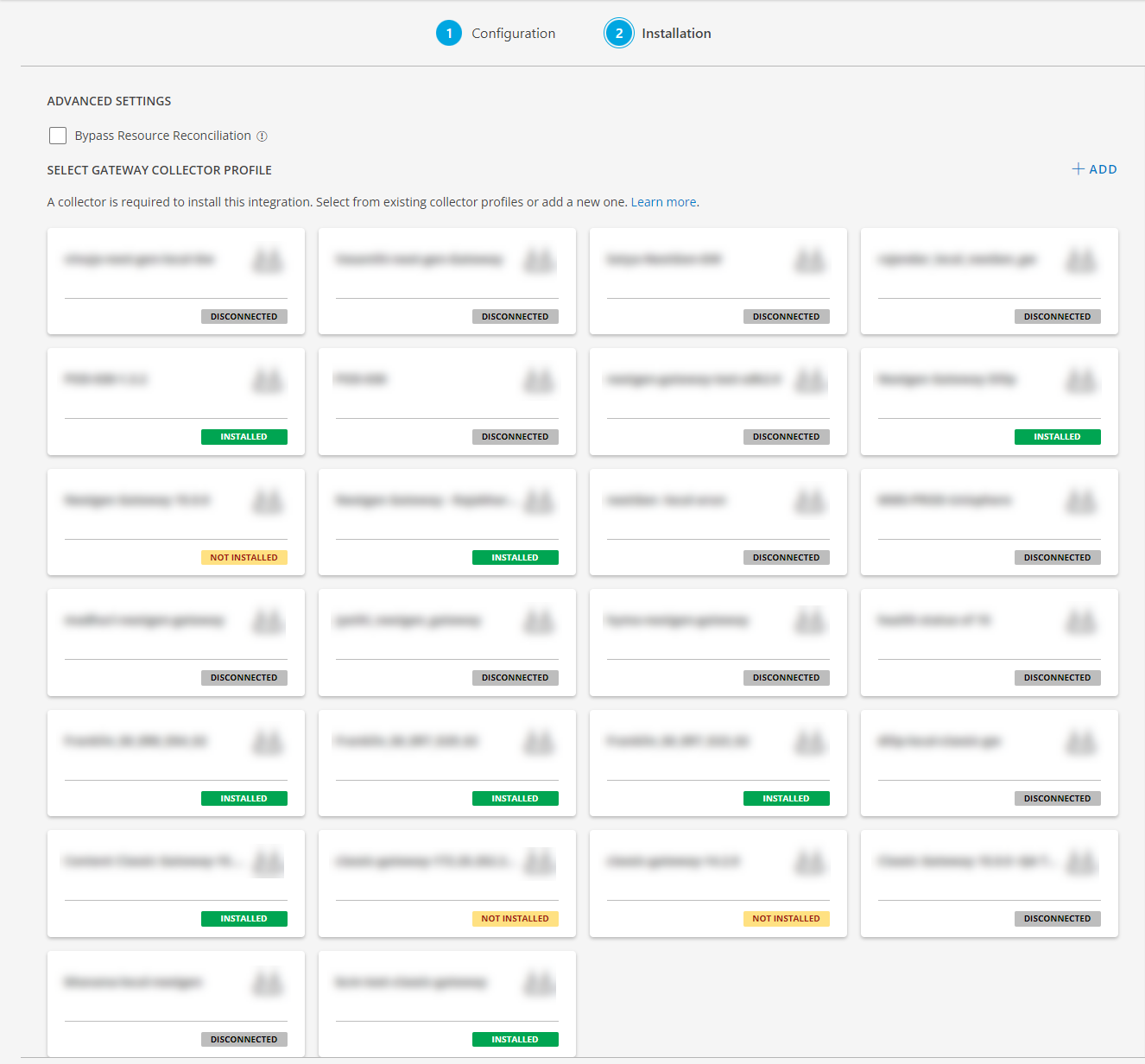
- Click FINISH.
The integration is now installed and displayed on the Installed Integration page. Use the search field to find the installed application.
Modify the Configuration
See Modify an Installed Integration or Application article.
Note: Select the Poly Trio application.
View the Polycom-Trio details
The Polycom Trio integration is displayed in the Infrastructure > Resources > Network Devices > VoIP. You can navigate to the Attributes tab to view the discovery details, and Metrics tab to view the metric details for Polycom-Trio.
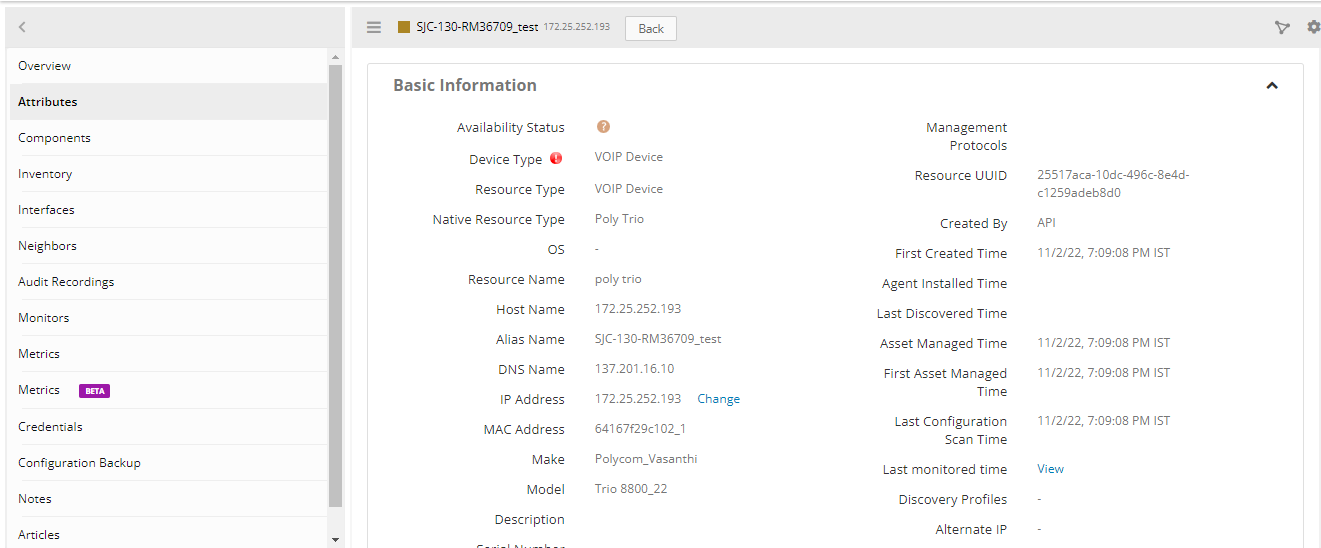
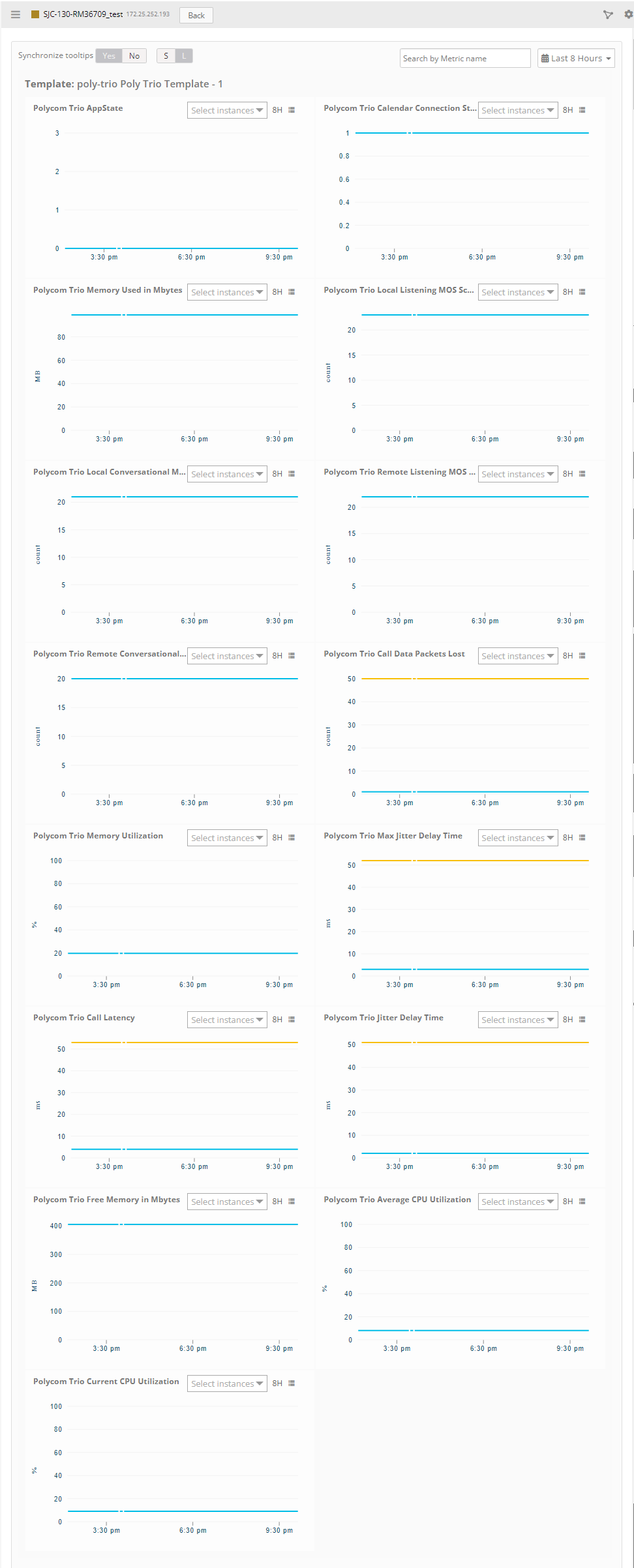
Supported Alert Custom Macros
Customize the alert subject and description with below macros then it will generate alert based on customisation.
Supported macros keys:
Click here to view the alert subject and description with macros
${resource.name}
${resource.ip}
${resource.mac}
${resource.aliasname}
${resource.os}
${resource.type}
${resource.dnsname}
${resource.alternateip}
${resource.make}
${resource.model}
${resource.serialnumber}
${resource.systemId}
${Custome Attributes in the resource}
${parent.resource.name}
Supported Metrics
Click here to view the supported metrics
| Native Type | Metric Name | Display Name | Metric Label | Unit | Application Version | Description |
|---|---|---|---|---|---|---|
| Poly Trio | polycom_trio_Current_CPU_Usage | Polycom Trio Current CPU Utilization | Usage | percent | 1.0.0 | The actual CPU Utilization at a specific point in time. |
| polycom_trio_Average_CPU_Usage | Polycom Trio Average CPU Utilization | Usage | percent | 1.0.0 | Provides device average CPU usage. | |
| polycom_trio_Used_Memory | Polycom Trio Memory Used in Mbytes | Usage | megabytes | 1.0.0 | Provides the amount of memory used. | |
| polycom_trio_Free_Memory | Polycom Trio Free Memory in Mbytes | Usage | megabytes | 1.0.0 | Provides device-free memory details. | |
| polycom_trio_Memory_Utilization | Polycom Trio Memory Utilization | Usage | percent | 1.0.0 | Provides device memory usage details. | |
| polycom_trio_Packets_Lost | Polycom Trio Call Data Packets Lost | Availability | count | 1.0.0 | Provides packets lost information while transmission | |
| polycom_trio_Jitter | Polycom Trio Jitter Delay Time | Performance | milliseconds | 1.0.0 | Variation in the time delay between the signal transmission and its receipt over a network connection. | |
| polycom_trio_Max_Jitter | Polycom Trio Max Jitter Delay Time | Performance | milliseconds | 1.0.0 | Maximum variation in the time delay between the signal transmission and its receipt over a network connection. | |
| polycom_trio_Latency | Polycom Trio Call Latency | Performance | milliseconds | 1.0.0 | The time taken for the data to get to the destination across the network. | |
| polycom_trio_RxMOSCQ | Polycom Trio Remote Conversational MOS Score | Availability | count | 1.0.0 | The ranking or score of the quality of voice and video sessions geted from remote conversational quality tests. | |
| polycom_trio_TxMOSCQ | Polycom Trio Local Conversational MOS Score | Availability | count | 1.0.0 | The ranking or score of the quality of voice and video sessions geted from local conversational quality tests. | |
| polycom_trio_RxMOSLQ | Polycom Trio Remote Listening MOS Score | Availability | count | 1.0.0 | The ranking or score of the quality of voice and video sessions geted from remote listening quality tests. | |
| polycom_trio_TxMOSLQ | Polycom Trio Local Listening MOS Score | Availability | count | 1.0.0 | The ranking or score of the quality of voice and video sessions geted from local listening quality tests. | |
| polycom_trio_Calendar_Connection_Status | Polycom Trio Calendar Connection Status | Availability | — | 1.0.0 | Provides calendar service connection status. | |
| polycom_trio_AppState | Polycom Trio AppState | Availability | — | 1.0.0 | Provides polycom device state info. |
Risks, Limitations & Assumptions
- Application can handle Critical/Recovery failure notifications for below two cases when user enables App Failure Notifications in configuration
- Connectivity Exception
- Authentication Exception
- Application will send any duplicate/repeat failure alert notification for every 6 hours.
- Latest snapshot metric is available from Gateway version 14.0.0.
- Support for Macro replacement for threshold breach alerts (i.e, customisation for threshold breach alert’s subject, description).
- No support of showing activity log and applied time.
- This application supports both Classic Gateway and NextGen Gateway.